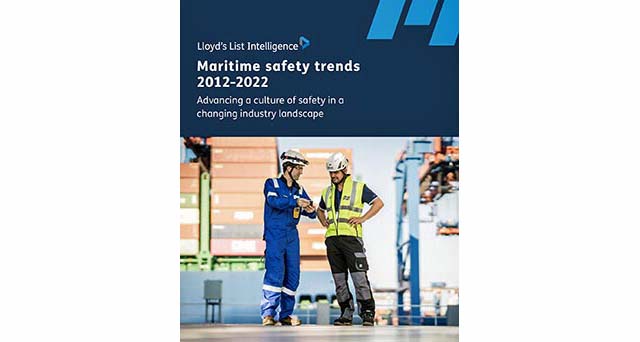A new jointly-produced report from DNV and Lloyd’s List Intelligence found a surge in the number of safety incidents involving machinery damage or failure, many resulting from uncertainties related to decarbonisation and digitalisation.
The report, Maritime safety trends 2012-2022: Advancing a culture of safety in a changing maritime landscape, concludes that with incidents on the rise, more needs to be done to address safety, particularly as the industry faces new challenges. The analysis found that the overall number of safety incidents increased by 9% in 2022, driven by a 12% increase in incidents involving machine damage or failure. This highlights the importance of developing a better understanding of new technologies and placing equal value on human, organisational and technological elements, helping to cultivate a robust safety culture in maritime companies and within the industry.
Knut Ørbeck-Nilssen, CEO Maritime, DNV said: “New technologies, alternative fuels and more advanced digital systems offer many solutions, but they also bring increased uncertainty and new risks. Rules, procedures and guidelines continue to be essential elements, but they mean less if they are not embraced by crew, or if they don’t become ingrained in the safety culture of a company. This will lead to a deeper awareness of the safety hurdles and a more comprehensive understanding of new technologies.”
Maritime stakeholders are encouraged to collaborate transparently in the safe transition to new fuels and technologies by contributing to the development of training programmes that are safe, reliable and realistic. Improved safety can also be achieved through more proactive investment in the psychological and physical welfare of a ship’s crew and onshore workers.
The importance of knowledge sharing and collaboration are highlighted in the report. The transition to new engine types and new fuels may lead to machine failure and accidents, and shipping companies should share what they have learned from these incidents so that the whole industry can achieve improved safety standards.
Ørbeck-Nilssen said: “Fundamentally, safe shipping relies on good leadership. We urge all players in the industry to put aside their competitive instincts and contribute to improved safety standards for all. This will ensure that every mistake can be learned from, and we all continue to maintain progress while – much more importantly – minimising the risk to human life and the environment.”
A copy of the full report can be requested here.



